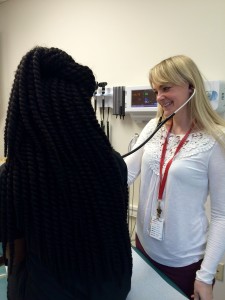WASHINGTON — The face of AIDS in the United States, and in the Washington, D.C. area is increasingly female. And far too many of these women are in denial about their condition.
Michelle Tate is living proof.
“I was told I had HIV in 2000 by a guy I dated,” she recalls, adding that the virus stayed dormant in her body for seven years until a stroke in her sleep landed her in a hospital. A routine blood test confirmed what she already knew but didn’t want to admit.
“I let it get so bad, I got full-blown AIDS. It got worse because I ignored all the signs of it,” Tate says.
Her weight plummeted, her hair fell out and she ended up on a suicide watch. One hospitalization followed another. Sometimes she took the pills she needed to fight the virus, sometimes she didn’t.
What turned her around was her child, and her intense desire to hold onto the daughter who was only a toddler when Tate was infected.
“My daughter is the only thing I have,” Tate whispers. But in truth, this AIDS survivor has much more.
“I am on a mission,” she says. It is a mission to spread the word about HIV/AIDS to other women in her community, and prevent them from making the same mistakes.
It is a tough message to spread, in large part because of a misconception in some areas that HIV/AIDS only affects gay and bisexual men. The reality is one in four people living with HIV is a woman, and in D.C., 92 percent of the infected women are African-American.
“I think it is harder because it is not as accepted for them to be HIV-postive, and I think they are less likely to deal with it and own it,” says Megan Dieterich, a physician’s assistant at Whitman Walker Health’s Max Robinson Center in Southeast D.C.

The Centers for Disease Control and Prevention says only 44 percent of the women diagnosed with HIV in 2011 were engaged in care, and just 32 percent had the virus under control, meaning they are less likely to pass it on to someone else.
Dieterich says the stigma is a bit different for women, and adds that a lot of it has to do with the fact that they are not necessarily at the center of all HIV prevention efforts.
The federal government’s Office of Women’s Health has made prevention the focus of this year’s National Women and Girls HIV/AIDS Awareness Day on March 10. But Dieterich says the best way to get the word out may be to rely on HIV-positive women in the community to spread the message — women like Michelle Tate.
“I figure that if I can tell my story, then they can learn from me,” Tate says.
She tells newly diagnosed women of her denial, her brushes with death and the inner strength that ultimately made her a survivor.
Dieterich says these grassroots efforts can be extraordinarily productive. She points to the successful effort in D.C. to convince women who learned they had HIV while pregnant to take the necessary medications to safeguard their child.
As a result, there has not been an HIV-infected baby born in D.C. since 2012, according to the D.C. Department of Health. The downside is, too many of these mothers stop taking the anti-viral drugs after they give birth.
Tate understands the pressures these women face, and acknowledges that there are days when she just doesn’t want to take her pills either. She says she knows she needs to take them to survive — and learning to survive and thrive with HIV is the name of the game.
“I feel good,” she says, and after a pause, “I am good.”







